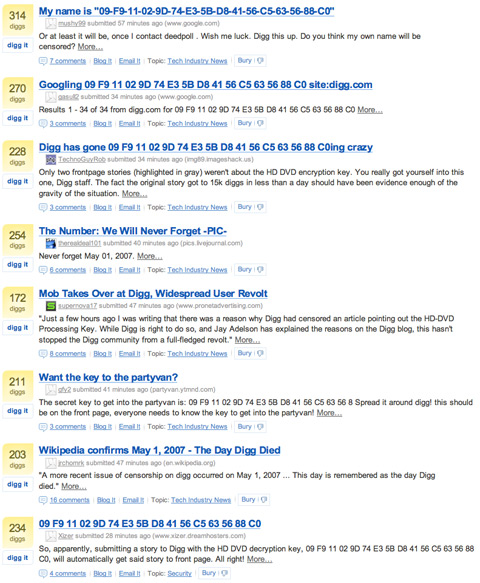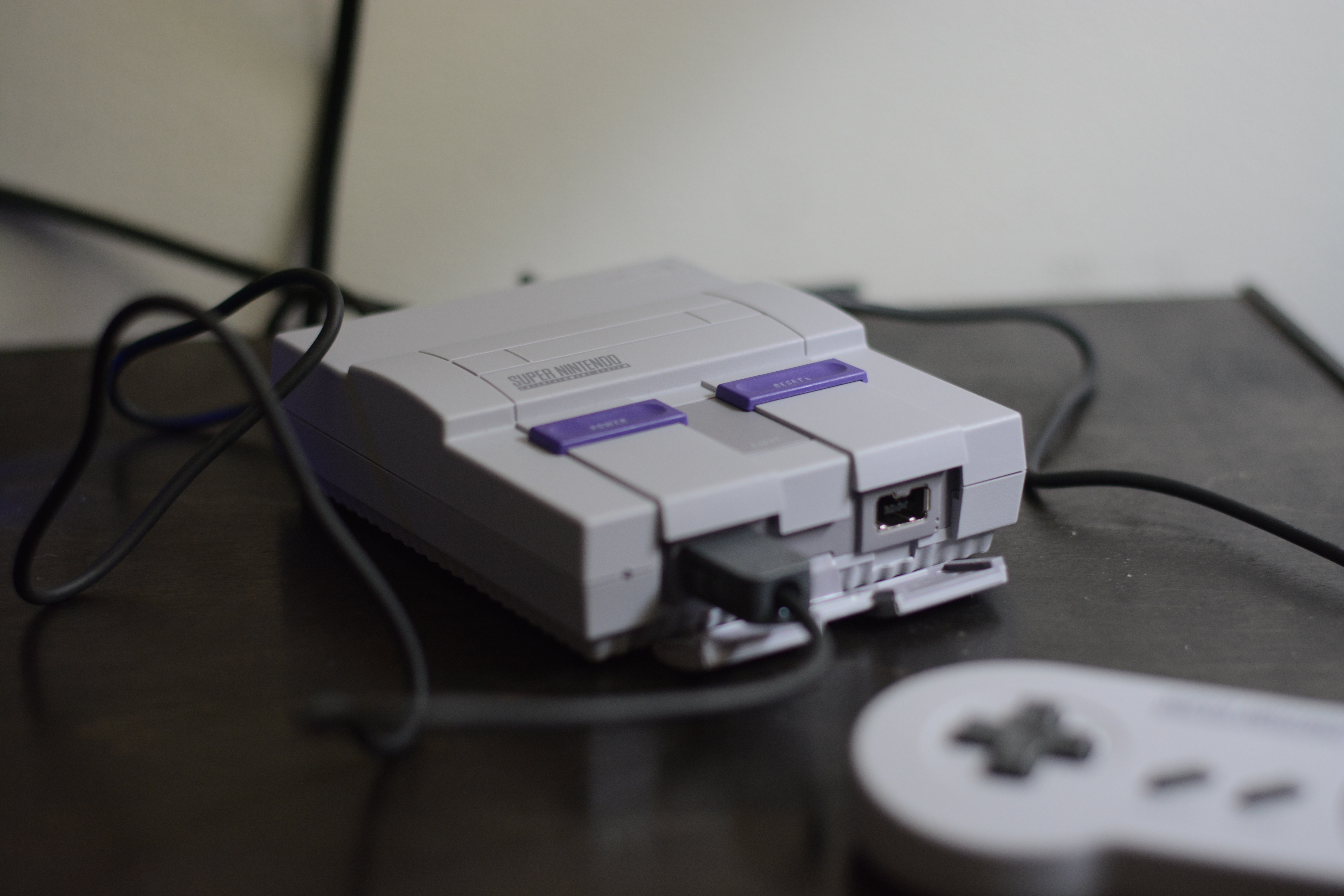
By David Ponce
It’s going on as I write this: users over at Digg are throwing a tantrum of unprecedented proportions and turning against the social bookmarking site they usually revere. They have effectively taken control of the home page and are bringing the servers to their knees, and this turn of events could very well cause some irreparable harm to the previously high-flying website. It’s all over HDDVD, AACS encryption, censorship and alleged bribery. Keep reading for the full story.
A few days ago, a hacker at the Doom9 forums published a string of numbers (a hexadecimal string, to be exact) that represents the master AACS key used in encrypting HD-DVD discs. While this number alone does not give anyone the ability to copy encrypted discs, it can be used to build software that does just that. Understandably, people got excited. Someone posted an initial story on Digg and it hit the front page in minutes… but was then deleted, presumably by Digg administrators. So, someone posted a second story that went on to pick up an unprecedented 15,000 votes before also being deleted. By now, it was clear that Digg was being pressured into censoring any story related to this. Users were being banned, stories deleted and censored… and sure enough some resentful articles started appearing. But things were about to get much worse.
Sometime last night, it surfaced that Digg’s vidcast, DiggNation, is partly sponsored by the HD DVD Promotion Group. Well, dudes and dudettes, at this point, all hell broke loose. Users started submitting thousands upon thousands of stories that featured the AACS string in one way or another, either in the title, or on a picture of a cute kitten, or on a random Blogger account. And all of them started hitting the front page. At once. As you can see from the above picture, nearly every single story is related to this.
So, what does this all mean? Well, Digg’s popularity grew on its democratic aspect. It was founded on the idea that the wisdom of the masses was better able to determine what’s interesting than the autocratic editor. But, like any democracy, it is prone to revolt and the very system that allows it to usually thrive can evidently be turned against itself. Of course this was always a possibility but it wasn’t until it happened that the consequences of a revolt became real. And believe me, there’s a bunch of consequences.
In this case, there’s no putting the cat back in the bag. The AACS encryption key is now public knowledge, and no reasonable effort at censorship will make it go away. How the AACS Licensing Authority will deal with this will be interesting to see, but in my opinion, there’s very little they can do. Someone, somewhere, is working on software that will allow us to copy HDDVDs as I write this. And it will be freely distributed on P2P networks, and that’s that.
But the damage done is likely to run deeper. Digg’s reputation both among its users and among its advertisers is likely to take a hit. Users, feeling treason, are likely to hold back from the site, at least for a while. Advertisers, on the other hand, may fear being associated with a site that has the potential to do things such as this, and this in turn may affect Digg’s ability to run its business. (Of course, I say this with a grain of salt, since websites like YouTube continue to thrive on essentially pirated content.) This is not to mention the very likely lawsuits that are about to hit Digg.
The real consequence however, at least in my mind, is that a bit of innocence has been lost. I know this sounds cliché, but it’s never been more true. The Web 2.0 world is a social world. What has changed on the internet over the last couple of years is the social revolution underway; sites like YouTube, FaceBook, Digg, Reddit, and others are all built around this new paradigm. But until now, the picture has been pretty much rosy. The Digg Mutiny is exposing the darker side of social media, and its disruptive potential; it’s hard not to wonder “What next?”. When users can so easily take control of the home page and break the law (yeah, I know, it’s an unpopular law, and a stupid law and one that I believe will be obsolete eventually. But it’s still a law), you have to wonder just what they can do next, and whether there’s anything that anyone can do about it.
[Update: A few minutes after posting this, I’ve noticed that Digg is offline.]





Try http://www.digg.com/ instead. Also, see http://blog.digg.com/?p=74?
Crisis over, we can all go home now.
I don’t think Digg users will turn away from it, especially now that they have made their point clear! I wonder what they are gonna do when the lawsuits follow. Let’s face it, the DMCA is a stupid and evil law. It basically says you can go to jail for simply knowing a certain number!
Mass immaturity. The hack was already all over the internet, it’s a shame that the AOL kiddies joined to create havoc for one site,, although it has been deteriorating rapidly lately,, This is what keeps the intellect down,
DIGG has had a reputation as the kindergarten section of Web 2.0. This is just the latest sign of that fact.
Yes! publish all that secret shit!
force all these monopolies out of the closet!
If their businesses are so poorly protected, they did not deserve them in the first place! Bring those tabus down!
What´s a stupid encription key?
If DIGG tried censoring information, they do not deserve their place in the free world!
One thing I’ve noticed in all of this is that a lot of users were screaming about how this was going against their freedom of speech, rights, et cetera.
To all of those people, I say this: Welcome to the internet – you’re not in kansas anymore.
With all the TOS agreements and so on, freedom of speech on (most of) the internet is not the presence of freedom, but rather a lack of a removal of it.
It is important to note that not all diggers reacted with the same teenage basement mutiny mentality:
http://www.paydayloanaffiliate.com/blog/DiggersVsDigg.aspx
David. I agree with most in your post. And yes in the US (and some other countries) their are laws on publishing this kind of information. But the problem is that the net is not US jurisdiction. DMCA is an American law, even if the big money is pushing it into EU right now.
But for me, let them push all DRM and idiotic laws out the door, in the end they will recognize that the problem isn’t piracy. Its the product. And the user experience when you buy a DVD today is that you are a criminal. Hey the only way to get a better video experience today is to use the film-only copy.
There are only a few sites I know of that have the power to bring most servers to their knees and Digg is one of them.
It’s become so common that they even have coined phrases used to describe when it happens. “the site has had a digging” or “the servers have been dugg”. The same is true for sites that get “slash dotted”.
The true power of a site such as Digg is it’s users and not it’s advertisers. This has to be considered by the owners of Digg and insure they stay true to what really matters. If they continue to focus on that they will always survive and thrive.
I know that slash dot users are proud of the fact that a site has been “slash dotted”. In my very humble opinion Digg needs to flex a few muscles and do what they can to stay true to it’s users and the TRUTH.
If a simple set of numbers is enough to bring down an encryption method then it’s the encryption method that is flawed and not Digg or its methods.
I SAY YIPPY! ITS ABOUT TIME WE GET BACK AT ALL THOSE POWERS THAT BE. “GIVE SOME BACK YOU SONS OF BITCHES THERES PEOPLE DIEING IN THE WORLD OPEN YOUR EYES AND FACE THE MUSIC YOU WILL SOON MEET YOUR MAKER, PREPARE YOURSELVS.”